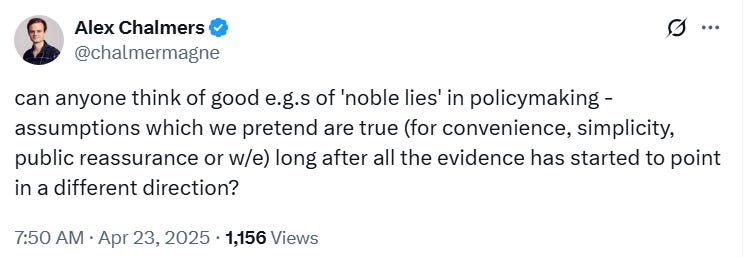WELCOME
This month’s edition of Policycraft contains links to two very different, but very practical, toolkits: one on building the capability to solve complex problems and another on storytelling for systems change. I’m still working my way through the former, the Problem Driven Iterative Adaptation (PDIA) Toolkit, given the wealth of external readings and resources linked within. The ideal way of absorbing it may be to use it - any Policycraft community members want to plan the most fun work retreat of all time?
We also have an injection of the social sciences into policy thought, via insights from the field of economics, tips for quantifying your public consultation readouts, and the neglected value of the null result in policymaking.
THIS MONTH’S SYLLABUS
⚙️ Problem Driven Iterative Adaptation Toolkit, Building State Capability, Harvard Kennedy School of Government
Policy feedback loops were discussed in a previous edition of Policycraft, but with minimal comment on how to get them up and running. The Building State Capacity initiative at Harvard is here to help, having created an in-depth toolkit for designing, standing-up, and running similar structures that help teams work through and take action on complex problems. This eminently practical 60-page document includes worksheets, videos, process maps, further reading, and much more. Imagine what a ‘tiger team’ of your smartest colleagues could do with this method when applied to one of Canada’s most pressing challenges.
⚙️ Storytelling for systems change, Centre for Public Impact
If you’ve worked in policy or politics long enough, you recognize how much a story can sway political decision-making. Politicians love telling stories, and they can be moved by a particularly telling or poignant anecdote in ways data rarely moves them. So how can we as policy thinkers and influencers use storytelling as an advocacy tool? The Centre for Public Impact, in collaboration with the Dusseldorp Forum and Australian social impact initiative Hands Up Mallee, have developed two reports dedicated to understanding and dissecting how storytelling can impact systems change. The reports aren’t structured like a traditional white paper, but contain a useful depth of information on their research methods, insights, and links to other storytelling resources.
💻 “Economics still matters for policy”, Economic Forces
Economist Brian Albrecht has a list of eight economic insights for policymakers, which he is slowly turning into more detailed posts (the first, on how prices are signals, can be found here).
He succinctly identifies the appropriate relationship between economics and policymaking, noting that his list “...won’t tell you what your policy goals should be, and they won’t resolve fundamental political debates—that’s not the role of economics. What they will do is help identify which policies might actually achieve their stated goals and which are likely to backfire.”
🎓 “Learning from the public: Using qualitative research methodologies in consultations”, Dr. Poornika Ananth, University of Bath
Crafting stories from qualitative data is one way to boost its persuasive power, but it’s not the means of getting the most out of your consultations. This is a short but practical brief for civil servants looking to use qualitative research methods in public consultation, including recommendations for adding a quantitative element through coding and dedicated software.
💻 “Policy needs null results”, Chalmermagne
One of the great lessons of aging is that knowing when not to act is as important as knowing when to act. Researcher Alex Chalmers makes the case that this wisdom is also true in policymaking - making a reflexive policy response so government can be seen to be ‘doing something’ may not just fail to solve the initial problem but may yet create new ones. When might policy restraint be called for? Can we resist the legislative bias toward action?
📣 Noble lies in policymaking, social media post by Alex Chalmers, Twitter/X
Alex Chalmers is also the source of this month’s Policycraft Fun Thought Experiment To Run With Your Colleagues Over Drinks (...we’ll workshop that title). What do we pretend is true even as the evidence tells us otherwise? How about: good intentions in policymaking matter as much - if not more - than a policy’s outcomes.




